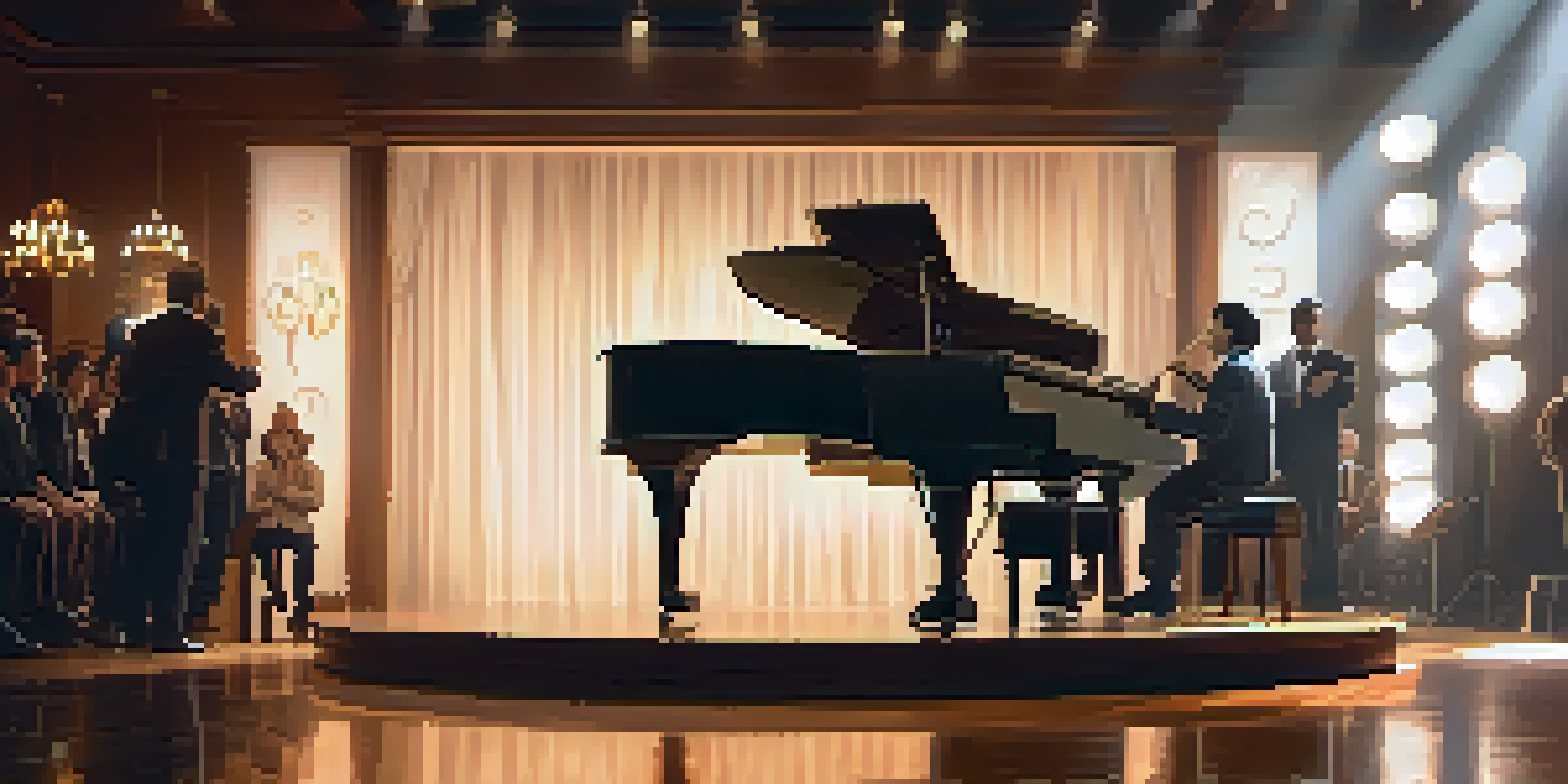Exploring the Impact of Film Scores on Audience Emotions

The Power of Music in Film: An Emotional Catalyst
Music has an extraordinary ability to evoke emotions, and film scores are no exception. They serve as a powerful backdrop, amplifying the emotional weight of a scene. Think about a suspenseful moment in a thriller; the tension is often heightened by the music, making the audience's heart race alongside the characters on screen.
Music is the shorthand of emotion.
Composers carefully craft these scores, understanding the psychological effects different sounds can have. For instance, a rising crescendo can signal impending danger, while a gentle melody might evoke nostalgia or warmth. This intentional use of music transforms a mere visual experience into an emotional journey.
Whether it’s the iconic theme of 'Star Wars' or the haunting notes of 'Titanic,' these scores linger in our minds long after we leave the theater. They not only define moments in films but also shape our emotions, reminding us of the power of sound in storytelling.
How Film Scores Guide Audience Reactions
Film scores do more than just complement visuals; they actively guide how we feel during a movie. For example, when a romantic scene unfolds, a soft, melodic score can enhance the tenderness of the moment. In contrast, a dissonant score during a conflict can create unease and anticipation.

This guidance is often subconscious, as viewers might not even realize how the music is influencing their reactions. It’s akin to how a warm hug feels comforting, while a sudden loud noise can startle us. The emotional cues from a film score can make us laugh, cry, or feel a sense of dread.
Music Amplifies Film Emotions
Film scores serve as powerful emotional catalysts, enhancing the audience's experience by amplifying the feelings conveyed in different scenes.
Moreover, directors often collaborate closely with composers to ensure that the score aligns perfectly with the film's narrative arc. This synergy is crucial, as it helps to create a cohesive emotional experience that resonates with audiences on a deeper level.
Cultural Context: Music's Role in Emotional Interpretation
The cultural context of music plays a significant role in how audiences interpret emotions in film. Different cultures have unique musical traditions that can alter the emotional landscape of a scene. For example, a dramatic scene accompanied by traditional Indian music may evoke different feelings than the same scene with Western orchestral music.
Film music is a powerful tool to evoke emotions and enhance storytelling.
This cultural nuance means that a film score needs to be thoughtfully composed, considering the target audience's background. A score that resonates can create a sense of familiarity, drawing viewers into the film's world. On the other hand, an unfamiliar score might leave audiences feeling disconnected.
Understanding these cultural implications allows filmmakers to create more inclusive and relatable narratives. As global cinema continues to expand, the integration of diverse musical styles becomes increasingly important in conveying universal emotions.
Iconic Film Scores and Their Emotional Legacy
Certain film scores have become iconic not only for their melodies but also for the emotions they evoke. Think of John Williams’ score for 'E.T.'—the music captures the innocence and wonder of childhood, leaving an indelible mark on audiences. These scores often become synonymous with the films themselves.
Moreover, they influence how we remember the moments from the films. For instance, the first few notes of 'The Godfather' theme can instantly transport you back to the film's powerful scenes. This emotional connection is a testament to the skill of the composer and the impact of their work.
Cultural Context Shapes Interpretation
The cultural background of music influences how audiences interpret emotions in film, making it essential for composers to consider diversity in their scores.
Ultimately, iconic scores evolve into cultural touchstones, reshaping how we perceive not just the films but the emotions they represent. They become part of our collective memory, illustrating the profound relationship between music and emotion in cinema.
Case Studies: Analyzing Specific Film Scores
To understand the impact of film scores, let's examine a few notable examples. Hans Zimmer's score for 'Inception' is a striking illustration of how music can create tension and excitement. The use of a slow build-up and layered sounds mirrors the film's intricate narrative structure, drawing audiences deeper into the dream world.
Another example is the score for 'The Lion King,' composed by Elton John and Hans Zimmer. The music not only enhances the storytelling but also evokes a deep sense of nostalgia and joy, connecting viewers to their own memories of childhood. This emotional resonance plays a vital role in the film's enduring popularity.
By analyzing these scores, we can see how composers use specific techniques to elicit emotions, whether it’s through rhythm, melody, or instrumentation. Each element works together to create an immersive experience that lingers long after the credits roll.
The Psychological Effects of Film Music on Audiences
Film scores can trigger specific psychological responses in viewers, shaping our overall experience of a movie. Research shows that certain musical elements can influence our heart rate, breathing, and even our neural responses. This physiological reaction can heighten our emotional engagement with the story.
For example, studies have found that suspenseful music can increase anxiety levels, making us feel more alert and involved in the action. Conversely, soothing melodies can induce relaxation, allowing us to connect more intimately with the characters and their journeys.
Music Amplifies Film Emotions
Film scores serve as powerful emotional catalysts, enhancing the audience's connection to the story.
By understanding these psychological effects, filmmakers can create more impactful narratives. A well-crafted score can make a scene more memorable and elicit a stronger emotional response, ultimately enhancing the storytelling experience.
Future Trends in Film Scoring and Emotional Engagement
As technology advances, the future of film scoring is set to evolve dramatically. Innovations such as artificial intelligence and interactive scoring are beginning to shape how music is created for films. Imagine a score that adapts in real-time to your emotional reactions while watching a movie!
This shift could deepen audience engagement, making each viewing experience unique. With the rise of streaming platforms, there's also a greater opportunity for composers to experiment with different styles, catering to diverse audiences and their emotional responses.

As we embrace these future trends, the relationship between film scores and audience emotions will only grow stronger. The potential to create even more immersive experiences is exciting, promising a new era of storytelling that resonates on a profound emotional level.